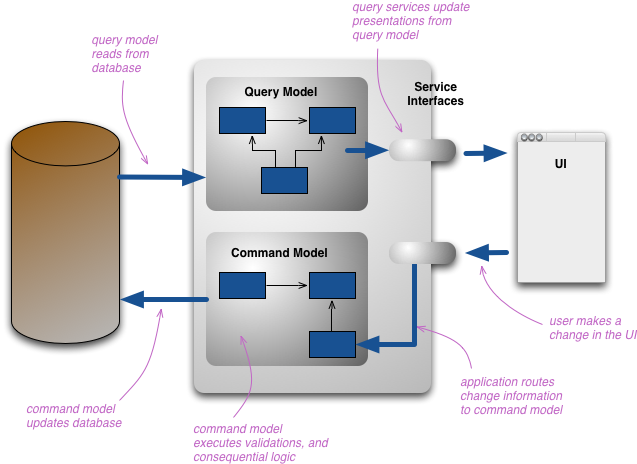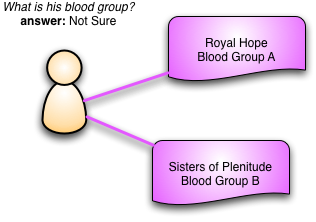tagged by: domain driven design
How to Move Beyond a Monolithic Data Lake to a Distributed Data Mesh

Many enterprises are investing in their next generation data lake, with the hope of democratizing data at scale to provide business insights and ultimately make automated intelligent decisions. Data platforms based on the data lake architecture have common failure modes that lead to unfulfilled promises at scale. To address these failure modes we need to shift from the centralized paradigm of a lake, or its predecessor data warehouse. We need to shift to a paradigm that draws from modern distributed architecture: considering domains as the first class concern, applying platform thinking to create self-serve data infrastructure, and treating data as a product.
Decentralizing the Practice of Architecture at Xapo Bank
Xapo was founded as a Bitcoin service provider and developed into an online bank. During this transition it needed to reassess its software estate and establish an architecture capability to guide its future. It took on ideas from Domain-Driven Design, Team Topologies, and the Architecture Advice Process to develop an Architectural Advice Forum. This led to greater alignment of its software delivery teams, and a coherent technology strategy.
Anemic Domain Model
This is one of those anti-patterns that's been around for quite a long time, yet seems to be having a particular spurt at the moment. I was chatting with Eric Evans on this, and we've both noticed they seem to be getting more popular. As great boosters of a proper Domain Model, this is not a good thing.
Bounded Context

Bounded Context is a central pattern in Domain-Driven Design. It is the focus of DDD's strategic design section which is all about dealing with large models and teams. DDD deals with large models by dividing them into different Bounded Contexts and being explicit about their interrelationships.
CQRS

CQRS stands for Command Query Responsibility Segregation. It's a pattern that I first heard described by Greg Young. At its heart is the notion that you can use a different model to update information than the model you use to read information. For some situations, this separation can be valuable, but beware that for most systems CQRS adds risky complexity.
Contextual Validation
In my writing endeavors, I've long intended to write a chunk of material on validation. It's an area that leads to a lot of confusion and it would be good to get some solid description of some of the techniques that work well. However life is full of things to write about, rather more than time allows.
Contradictory Observations

Many computer systems are built to house data and turn it into useful information for humans. When we do this there is a natural desire to make that information consistent. After all what use is there of a computer system that's in two minds about things?
Currency As Value
There are many common examples of ValueObject, my favorite is Money - and one closely linked to Money is currency.
Customer Loyalty Software
I was in the Calgary office last week and had a good chat with John Kordyback, one of our most trusted technical leads. He's worked on, and dug into, a number of travel loyalty software systems (frequent flyer/sleeper etc) and we talked about the nature of these kinds of things and how to think about them in a more fruitful manner.
D D D_ Aggregate
Aggregate is a pattern in Domain-Driven Design. A DDD aggregate is a cluster of domain objects that can be treated as a single unit. An example may be an order and its line-items, these will be separate objects, but it's useful to treat the order (together with its line items) as a single aggregate.
Domain Driven Design
Domain-Driven Design is an approach to software development that centers the development on programming a domain model that has a rich understanding of the processes and rules of a domain. The name comes from a 2003 book by Eric Evans that describes the approach through a catalog of patterns. Since then a community of practitioners have further developed the ideas, spawning various other books and training courses. The approach is particularly suited to complex domains, where a lot of often-messy logic needs to be organized.
Eager Read Derivation

One of the interesting talks I attended at QCon San Francisco, was one given by Greg Young about a particular architecture he'd used on a recent system. Greg is a big fan of Domain Driven Design, in this case it needs to be used with a system that has to process a high transaction rate and provide data to lots of users. There were a number of things I found interesting about his design, particularly his use of Event Sourcing, but for this post I want to dwell on just one aspect - what I'll call Eager Read Derivation.
Evans Classification
In his excellent book Domain Driven Design, Eric Evans creates a classification of the different kinds of domain objects that you're likely to run into.
Type Instance Homonym
“'War and Peace' is a wonderful book.
“Let me see... pity this book has such a tattered cover”
Two sentences, each uses the word 'book'. We glance over combinations like this every day without remarking that the word 'book' means something completely different in each of those sentences.
Ubiquitous Language
Ubiquitous Language is the term Eric Evans uses in Domain Driven Design for the practice of building up a common, rigorous language between developers and users. This language should be based on the Domain Model used in the software - hence the need for it to be rigorous, since software doesn't cope well with ambiguity.
Value Object
When programming, I often find it's useful to represent things as a compound. A 2D coordinate consists of an x value and y value. An amount of money consists of a number and a currency. A date range consists of start and end dates, which themselves can be compounds of year, month, and day.
As I do this, I run into the question of whether two compound objects are the same. If I have two point objects that both represent the Cartesian coordinates of (2,3), it makes sense to treat them as equal. Objects that are equal due to the value of their properties, in this case their x and y coordinates, are called value objects.
